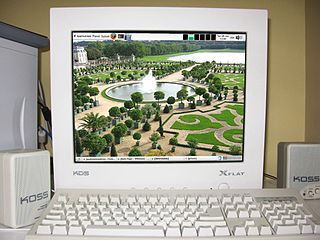A scenario is a synopsis of a series of actions and events in a work of the performing arts that lacks a full script, such as a ballet.
Contents
Scenario or scenarios may also refer to:
A scenario is a synopsis of a series of actions and events in a work of the performing arts that lacks a full script, such as a ballet.
Scenario or scenarios may also refer to:
Session may refer to:
Environment most often refers to:
Boom may refer to:
Production may refer to:
Flow may refer to:
A map is a symbolic visual representation of an area.
Ignition may refer to:
A robot is a virtual or mechanical artificial agent, usually an electro-mechanical machine.
In software engineering, a test case is a specification of the inputs, execution conditions, testing procedure, and expected results that define a single test to be executed to achieve a particular software testing objective, such as to exercise a particular program path or to verify compliance with a specific requirement. Test cases underlie testing that is methodical rather than haphazard. A battery of test cases can be built to produce the desired coverage of the software being tested. Formally defined test cases allow the same tests to be run repeatedly against successive versions of the software, allowing for effective and consistent regression testing.
History is the study of the past.
A voice-user interface (VUI) makes spoken human interaction with computers possible, using speech recognition to understand spoken commands and answer questions, and typically text to speech to play a reply. A voice command device is a device controlled with a voice user interface.
Cameo or CAMEO may refer to:
Dialogue is a conversational exchange.
Comment may refer to:
Migration, migratory, or migrate may refer to:

Human–computer interaction (HCI) is research in the design and the use of computer technology, which focuses on the interfaces between people (users) and computers. HCI researchers observe the ways humans interact with computers and design technologies that allow humans to interact with computers in novel ways. A device that allows interaction between human being and a computer is known as a "Human-computer Interface (HCI)".
All in One or All-in-One may refer to:
Talk may refer to:
Automation bias is the propensity for humans to favor suggestions from automated decision-making systems and to ignore contradictory information made without automation, even if it is correct. Automation bias stems from the social psychology literature that found a bias in human-human interaction that showed that people assign more positive evaluations to decisions made by humans than to a neutral object. The same type of positivity bias has been found for human-automation interaction, where the automated decisions are rated more positively than neutral. This has become a growing problem for decision making as intensive care units, nuclear power plants, and aircraft cockpits have increasingly integrated computerized system monitors and decision aids to mostly factor out possible human error. Errors of automation bias tend to occur when decision-making is dependent on computers or other automated aids and the human is in an observatory role but able to make decisions. Examples of automation bias range from urgent matters like flying a plane on automatic pilot to such mundane matters as the use of spell-checking programs.

Data scraping is a technique where a computer program extracts data from human-readable output coming from another program.